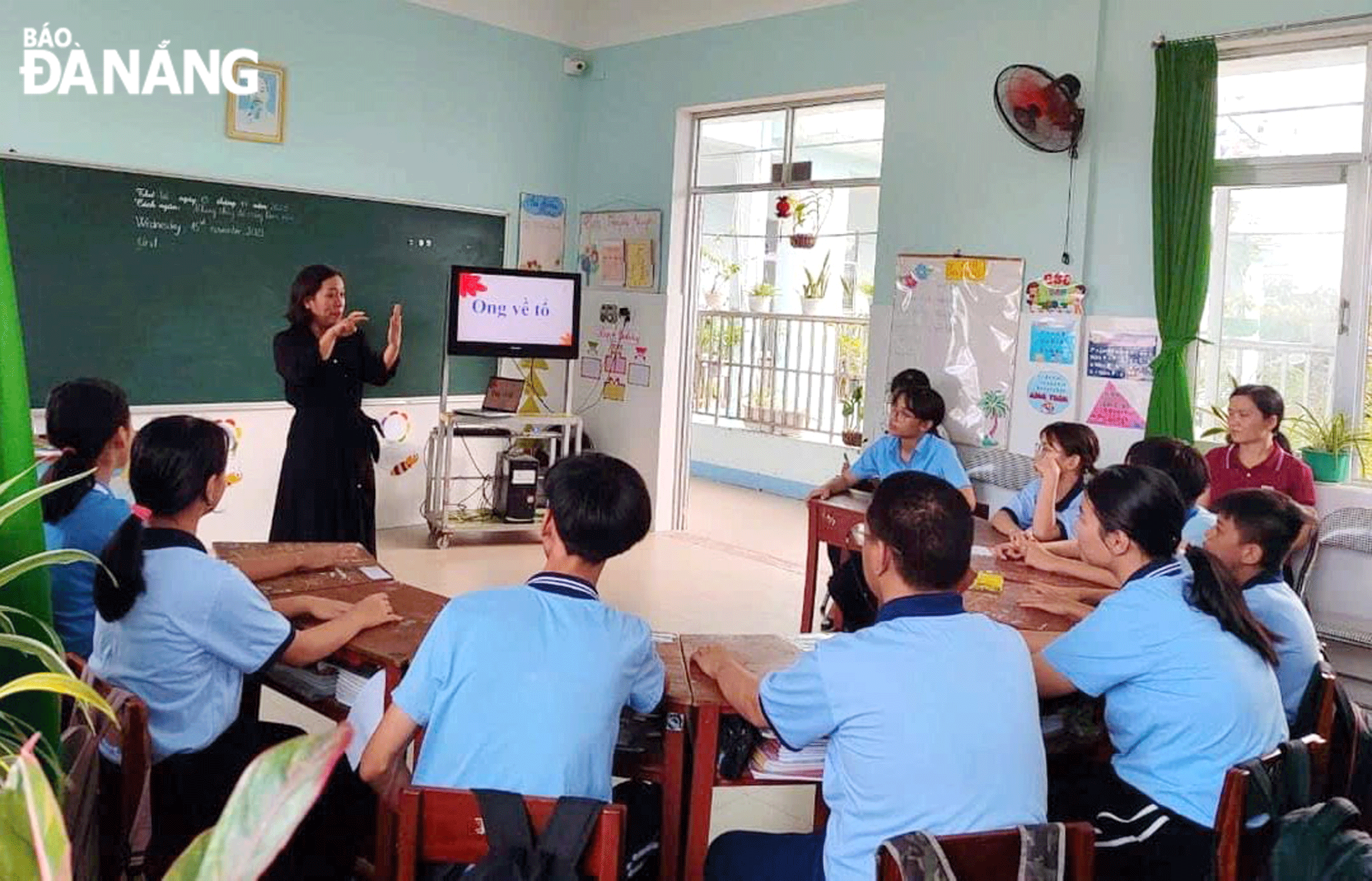Supporting disabled children to attend school
The collaboration and support from local authorities, the education sector, and various organisations have enabled many disabled children to access education, acquire life skills, and confidently integrate into the community.
 |
| Pupils at Tuong Lai (Future) Special School engage in both academic learning and vocational activities, fostering their independence. Photo: T.P |
For years, the Tuong Lai Special School has served as a nurturing home for hundreds of disabled children. Many of them have overcome their challenges and achieved significant successes in life.
According to Deputy Principal Truong Thi Ngoc Ha, the school currently has 274 pupils in the 2024-2025 academic year, most of whom have intellectual or hearing impairments. At the start of each academic year, the school assesses new pupils and provides guidance to parents, recommending suitable schools for their children. For those with mild disabilities, the school advises enrolment in inclusive community schools. This year, five children were transferred to external schools based on these recommendations.
Ms. Ha stated that the pupils follow the 2018 general education curriculum, adapted to suit their abilities. They also learn a specialised curriculum focusing on three key skills, including communication, social interaction, and self-care. These skills enable children to connect with others, integrate better, and gain opportunities to showcase their abilities. Additionally, pupils receive guidance on simple tasks such as beadwork, flower arranging, hair washing, and motorbike cleaning. "Seeing them proficiently handle these everyday tasks fills us, as teachers, with immense pride. Many of them have been able to secure jobs and earn a living after graduation" shared Ms. Ha.
Since 2023, the school has benefited from the Community-Based Access to Education for Children with Disabilities in Central Viet Nam project, supported by the Korean organisation Medipeace. The project has provided various teaching aids, including televisions, computers, and educational materials. The school hopes for increased investment from the city in teaching equipment, playgrounds, and vocational rooms to create the best learning environment for its pupils.
In Cam Le District, 100 disabled children are receiving comprehensive care in education, healthcare, nutrition, and recreation through the Hope Care for Disabled Children project funded by the Children of Viet Nam (COV) organisation.
Ms. Nguyen Thi Ly, Deputy Head of the Labour, Invalids, and Social Affairs Office, stated that the project, launched in July 2023, is slated to continue until 2026 with a total budget of VND 2.9 billion. COV classifies disabilities to provide early interventions, such as specialised education for autistic children, individual speech therapy for hearing-impaired children, and rehabilitation services.
Most of the children attend public, private, or specialised schools. For those unable to attend school due to family circumstances, COV and project staff actively encourage re-enrolment. As a result, 88 out of 100 children have returned to school, a 20% increase from the initial figure. During holidays such as Tet, Mid-Autumn Festival, and International Children’s Day, COV distributes gifts and organises activities for the children.
Thanks to medical support from the project, Nguyen Pham Hao Nhien, residing in Khue Trung Ward, can now sit, stand, and walk. Similarly, Phan Thi My Hoa, living in Hoa An Ward, who comes from a disadvantaged family, has undergone physical therapy and can now walk and attend school.
Since its inception, the project has conducted six training sessions for caregivers, equipping them with skills and knowledge on caring for disabled children and understanding their psychological needs during puberty. “The project has brought about significant progress and positive changes in the children. Families are less burdened and more motivated to support their children’s education and healthcare. Caregivers also benefit from mental and physical support, which has been a tremendous encouragement,” Ms. Ly noted.
In the 2024-2025 academic year, the city’s Department of Education and Training issued guidelines on educating disabled pupils and conducted training on early detection and intervention. Workshops were also held for managers, education officers, and primary and preschool teachers on inclusive education for disabled pupils. This demonstrates the city’s commitment to ensuring that disabled children are cared for, respected, educated, and granted all the rights they deserve.
Reporting by THANH PHUONG - Translating by TRUC VY